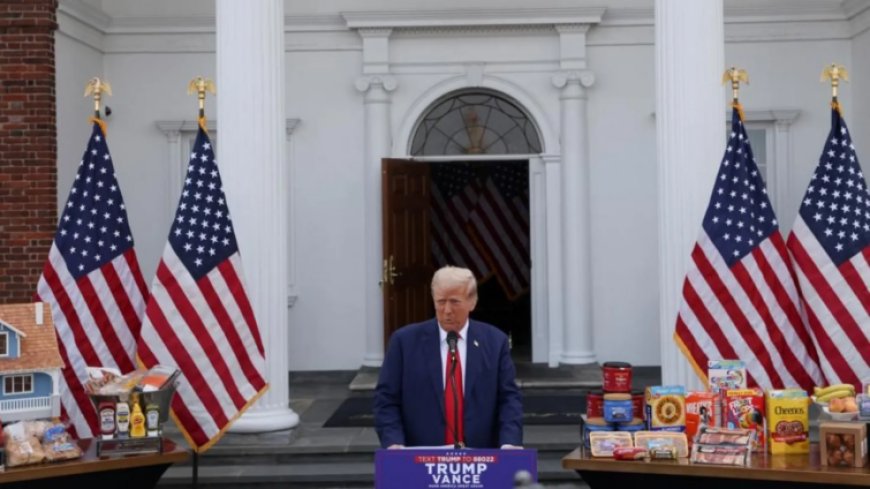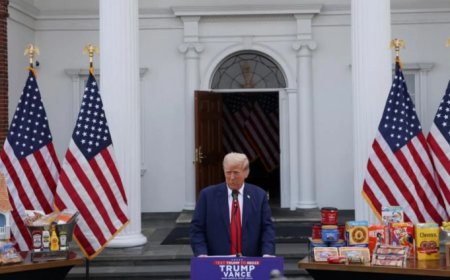Trump Proposes Government Funding for IVF to Appeal to Women Voters
Republican candidate Donald Trump announced that if elected, he will require government or insurance companies to cover IVF fertility treatments. This proposal aims to appeal to women voters, especially as he faces growing opposition from women on reproductive rights issues.

Republican presidential candidate Donald Trump said on Thursday he will require the government or insurance companies to pay for IVF fertility treatments if he is elected in November, a move likely aimed at appealing to women and suburban voters.
"We want to produce babies in this country, right?" Trump said during a town hall-style campaign event in La Crosse, Wisconsin, on Thursday.
Earlier in the day in Michigan, Trump also said his administration would push for allowing new parents to deduct "major newborn expenses" from their taxes.
Opinion polls show Trump has lost ground with women voters since Vice President Kamala Harris became the Democratic candidate in the Nov. 5 election. Harris led Trump by 49% to 36% - or 13 percentage points - among women voters in a Reuters/Ipsos poll published on Thursday, compared to her 9-point lead in polls conducted in July.
In speeches, Harris has attacked Trump's abortion position and painted Republicans as a threat to women's rights, including access to birth control, abortion medication and fertility treatments.
Trump, who as president appointed three of the justices who made up the majority that ended constitutional protection for abortion, has said the matter is now to be decided by individual states.
Last week, Trump posted on his Truth Social account that his administration would be "great for women and their reproductive rights" - a statement that was viewed by some as an attempt by Trump to moderate his position and drew criticism from evangelical supporters.
Trump's running mate, U.S. Senator JD Vance, said on Sunday that Trump would veto a national abortion ban if one were to be passed by Congress.
Trump caused confusion on Thursday when he seemed to suggest in an interview with NBC News that he would vote in his home state of Florida this November in favor of an amendment to enshrine abortion rights in the state constitution and overturn a current six-week abortion ban.
"I am going to be voting that we need more than six weeks," Trump said.
But his campaign quickly clarified his statement, saying Trump has yet to make up his mind about the amendment, which is strongly opposed by the anti-abortion groups that have backed Trump's candidacy.
Marjorie Dannenfelser, president of Susan B. Anthony Pro-Life America, an anti-abortion lobby group, said in a statement that she spoke on the phone with Trump after his remarks and was told that he remains undecided.
A spokesperson for Harris, Sarafina Chitika, said on Thursday that Trump should not be trusted on issues relating to women's reproductive care.
"Because Trump overturned Roe v. Wade, IVF is already under attack and women’s freedoms have been ripped away in states across the country," Chitika said.
IVF has emerged as a hot-button issue in this election, as Republicans nationwide have scrambled to contain backlash from a decision by the Alabama Supreme Court, which ruled in February that embryos were children.
That ruling left it unclear how to legally store, transport and use embryos, prompting some IVF patients to consider moving their frozen embryos out of the state.
Trump did not elaborate on how his administration would cover the cost of IVF treatments and changes to the U.S. tax code, or whether he would seek congressional action on his proposals.
"Government is going to pay for it, or we're going to get or mandate your insurance company to pay for it," he said.
Not all states currently require insurance companies to cover IVF, which involves combining eggs and sperm in a laboratory dish to create an embryo for couples having difficulty conceiving. IVF is expensive even with coverage and can cost thousands of dollars in drugs and medical procedures.
What's Your Reaction?






































































